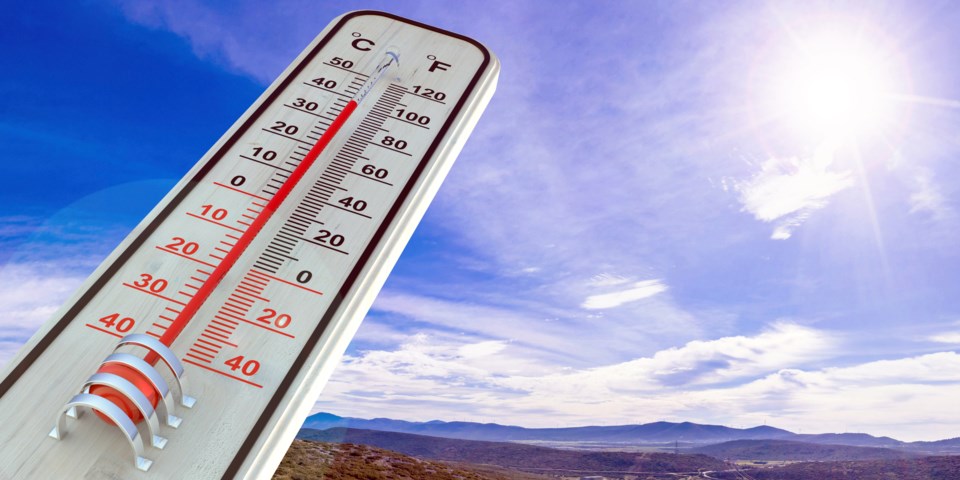Stay hydrated, keep cool and check in on the vulnerable people in your life.
The City of New Westminster is issuing that message to local residents in the face of a heat warning issued by Environment Canada for Friday, June 25 to Tuesday, June 29.
Environment Canada is warning of a “dangerous, long-duration heat wave” that will affect the vast majority of B.C., with temperatures in the Lower Mainland ranging from 34 to 38 C – and humidex values reaching the high 30s to low 40s.
“An exceptionally strong ridge of high pressure will develop over British Columbia, likely resulting in record-breaking temperatures,” a weather alert from Environment Canada says. “The duration of this heat wave is concerning as there is little relief at night with elevated overnight temperatures. This record-breaking heat event will increase the potential for heat-related illnesses.”
The city is offering up this list of tips to help keep everyone – humans and animals alike – safe in the heat:
1. STAY HYDRATED
- Drink cool beverages (preferably water) regardless of your activity level. Don’t wait until you are thirsty.
- If your health-care provider generally limits the amount of fluid you drink or has you on water pills, ask about increasing the amount of water you can drink while the weather is hot.
2. KEEP COOL
- Spend the hottest hours of the day out of the sun and heat in a cool location like an air-conditioned facility when possible, following COVID guidelines in all areas.
- Use public splash pools, water parks or pools, following COVID guidelines, or take a cool bath or shower.
- During the hottest hours of the day, fans alone are not effective. Applying cool water mist or wet towels to your body prior to sitting in front of a fan is a quick way to cool off.
- Dress for the weather by wearing loose, lightweight clothing. Protect yourself from the sun by wearing a wide-brimmed hat and sunglasses.
- Keep your home cool. Close windows early in the morning to keep the cool night air in and the increasingly hot daytime air out. Close shades, use an air conditioner and prepare meals that do not require an oven.
- If you have children and you must open a window for fresh air, ensure there is a safety lock in place that will not allow the window to be opened more than six to eight inches. Screens on the window will not protect children or pets from falling out.
- Avoid sunburn; stay in the shade or use sunscreen with SPF 30 or more.
- Avoid tiring work or exercise in the heat. Limit outdoor activity during the day to early morning and evening.
- NEVER leave children or pets alone in a parked car. During warm weather, temperatures can rise very quickly to dangerous levels within an enclosed vehicle. Leaving the car windows slightly open or "cracked" will not keep the inside of the vehicle at a safe temperature.
- Limit your pet’s activity and take dogs on walks in the morning or evening when the temperature is lower and reduce outdoor playtime during the day.
- Test the pavement on sunny days using the back of your hand or wrist. Pavement can get very hot and burn the pads on your dog’s feet.
3. CHECK IN ON OTHERS
- Those who live alone are at high risk of severe heat-related illness. Check in regularly with elders, those who are unable to leave their homes and anyone who may not be able to cope with extreme temperatures inside or outside the home.
- If someone is unwell, move them to a cool, shady spot, help them get hydrated if able to swallow, and call for medical assistance if required.
4. STAY INFORMED
- Monitor local news and weather channels.
- For more information on heat-related illness, call HealthLink BC at 811.
– source: City of New Westminster
Follow Julie MacLellan on Twitter @juliemaclellan.
Email Julie, [email protected].



